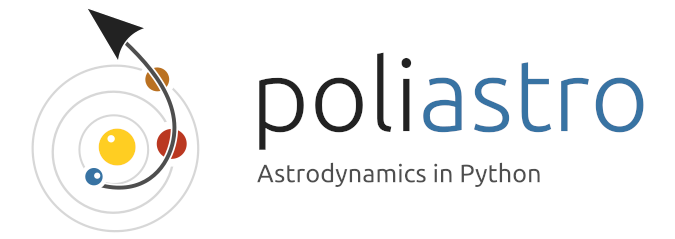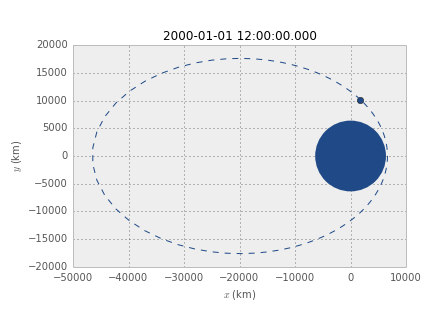=========
Project description

- Name:
poliastro
- Website:
- Author:
- Version:
0.14.0
poliastro is an open source pure Python package dedicated to problems arising in Astrodynamics and Orbital Mechanics, such as orbit propagation, solution of the Lambert’s problem, conversion between position and velocity vectors and classical orbital elements and orbit plotting, focusing on interplanetary applications. It is released under the MIT license.
from poliastro.examples import molniya
molniya.plot()
Documentation
Complete documentation, including a user guide and an API reference, can be read on the wonderful Read the Docs.
Examples
In the examples directory you can find several Jupyter notebooks with specific applications of poliastro. You can launch a cloud Jupyter server using binder to edit the notebooks without installing anything. Try it out!
https://beta.mybinder.org/v2/gh/poliastro/poliastro/0.14.x?filepath=index.ipynb
Requirements
poliastro requires the following Python packages:
NumPy, for basic numerical routines
Astropy, for physical units and time handling
numba (optional), for accelerating the code
jplephem, for the planetary ephemerides using SPICE kernels
matplotlib, for orbit plotting
plotly, for 2D and 3D interactive orbit plotting
SciPy, for root finding and numerical propagation
poliastro is tested on Linux, OS X and Windows on Python 3.6, 3.7 and 3.8 against latest NumPy.
Installation
The easiest and fastest way to get the package up and running is to install poliastro using conda:
$ conda install poliastro --channel conda-forge
Please check out the documentation for alternative installation methods.
Problems and suggestions
If for any reason you get an unexpected error message or an incorrect result, or you want to let the developers know about your use case, please open a new issue in the issue tracker and we will try to answer promptly.
Contributing
poliastro is a community project, hence all contributions are more than welcome! For more information, head to CONTRIBUTING.rst.
Support
Release announcements and general discussion take place on our Mailing List .
For further clarifications and discussions, feel free to join Poliastro Chat Room.
Citing
If you use poliastro on your project, please drop me a line.
You can also use the DOI to cite it in your publications. This is the latest one:
And this is an example citation format:
Juan Luis Cano Rodríguez et al.. (2015). poliastro: poliastro 0.4.0. Zenodo. 10.5281/zenodo.17462
License
poliastro is released under the MIT license, hence allowing commercial use of the library. Please refer to the COPYING file.
FAQ
What’s up with the name?
poliastro comes from Polimi, which is the shortened name of the Politecnico di Milano, the Italian university where I was studying while writing this software. It’s my tiny tribute to a place I came to love. Grazie mille!
Can I do <insert awesome thing> with poliastro?
poliastro is focused on interplanetary applications. This has two consequences:
It tries to be more general than other Flight Dynamics core libraries more focused on Earth satellites (see Related software for a brief list), allowing the algorithms to work also for orbits around non-Earth bodies.
It leaves out certain features that would be too Earth-specific, such as TLE reading, SGP4 propagation, groundtrack plotting and others.
What’s the future of the project?
poliastro is actively maintained and receiving an influx of new contributors thanks to the generous sponsorship of Google and the European Space Agency. The best way to get an idea of the roadmap is to see the Milestones of the project.
Project details
Release history Release notifications | RSS feed
Download files
Download the file for your platform. If you're not sure which to choose, learn more about installing packages.
Source Distribution
Built Distribution
File details
Details for the file poliastro-0.14.0.tar.gz.
File metadata
- Download URL: poliastro-0.14.0.tar.gz
- Upload date:
- Size: 7.5 MB
- Tags: Source
- Uploaded using Trusted Publishing? No
- Uploaded via: twine/3.1.1 pkginfo/1.5.0.1 requests/2.23.0 setuptools/46.1.1 requests-toolbelt/0.9.1 tqdm/4.42.1 CPython/3.8.0
File hashes
| Algorithm | Hash digest | |
|---|---|---|
| SHA256 | 911f08e1257b9714cdb65203354bc3d6c9459cd786858464b87e92df57c0dc80 |
|
| MD5 | 5a38fa475b878c7e1a19f909517d2eba |
|
| BLAKE2b-256 | 9803400e397862a6af10b9efb417f31d07d6d323d850d31a415bfe7b945c2381 |
Provenance
File details
Details for the file poliastro-0.14.0-py3-none-any.whl.
File metadata
- Download URL: poliastro-0.14.0-py3-none-any.whl
- Upload date:
- Size: 142.5 kB
- Tags: Python 3
- Uploaded using Trusted Publishing? No
- Uploaded via: twine/3.1.1 pkginfo/1.5.0.1 requests/2.23.0 setuptools/46.1.1 requests-toolbelt/0.9.1 tqdm/4.42.1 CPython/3.8.0
File hashes
| Algorithm | Hash digest | |
|---|---|---|
| SHA256 | c184a0285c32454a276862b8e135bd7cca0ea4359cbe254ae745d49652eb0741 |
|
| MD5 | ea2e09367b851d6fffacec2ecadfe0ac |
|
| BLAKE2b-256 | 5955298e588a1d9ddcbd8c271bc4ae731c53e688aabdb4aefd2488154adaaf50 |























